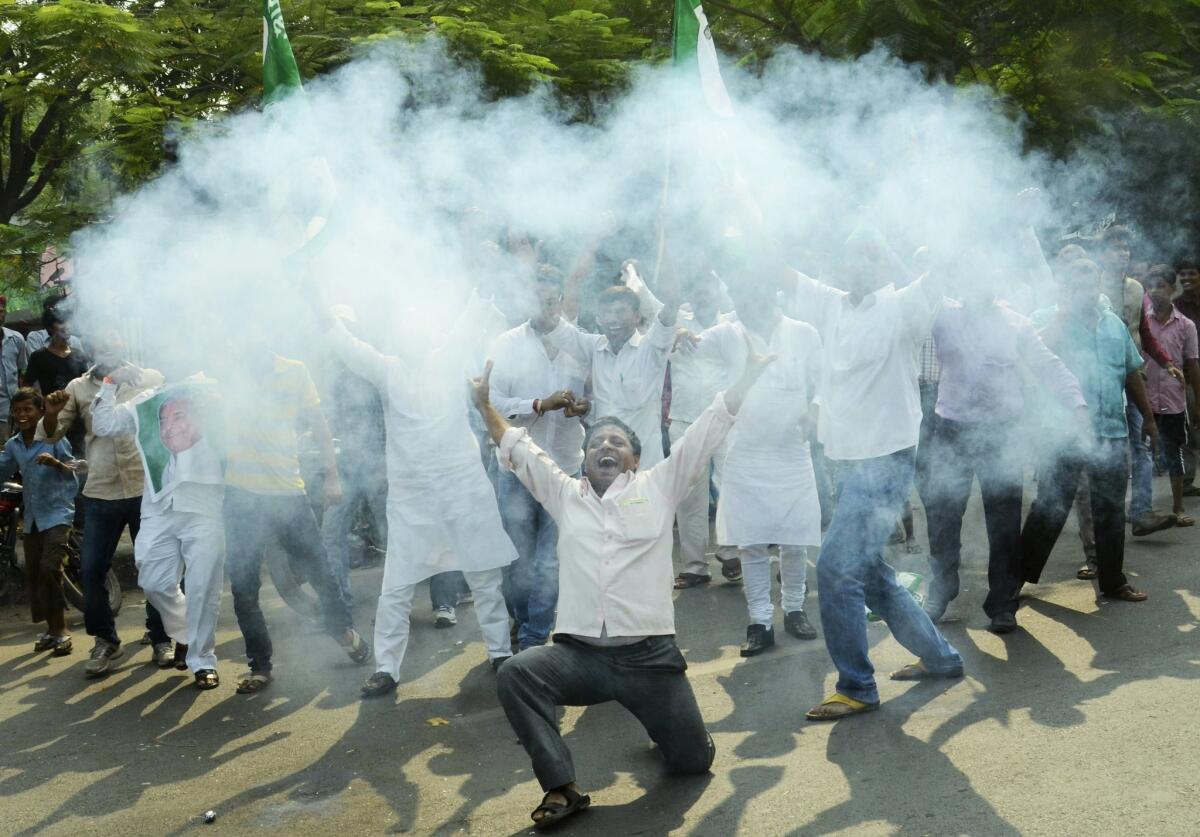A big setback for India’s Narendra Modi

Supporters of an alliance of parties opposed to India’s ruling Bharatiya Janata Party light firecrackers to celebrate as early results of Bihar state elections indicate victory for them in Patna, India, on Sunday.
- Share via
Reporting from Mumbai, India — Indian Prime Minister Narendra Modi suffered a significant political setback Sunday in a widely watched state assembly election, losing a bitterly fought campaign to an alliance of rival parties.
The loss in Bihar, where Modi campaigned fiercely, was viewed as a rebuke of the governing Bharatiya Janata Party’s often divisive rhetoric and of Modi’s year-and-a-half in power, which critics say has failed to bring the economic reforms he promised.
The campaign in Bihar, one of India’s poorest states, was marred by allegations that Modi’s conservative party was trying to exploit caste and religious differences -- particularly between majority Hindus and minority Muslims -- to appeal to voters.
Amit Shah, the BJP’s president, drew criticism for saying that if the party lost in Bihar, fireworks would be set off in Muslim-dominated Pakistan, India’s blood rival.
It was the second major state election that Modi’s party lost this year, after an upstart anti-corruption party won control of the local government in the national capital, New Delhi, in February.
The winning alliance, led by the state’s two-term chief executive, Nitish Kumar, won nearly three-quarters of the 243 state assembly seats. The BJP won less than a quarter.
“Narendra Modi’s authority will decrease,” said Shaibal Gupta, a prominent social scientist in Patna, Bihar’s capital. “Critics within the party might pounce on him.”
Gupta said Modi’s economic agenda could be further derailed because the BJP lost a chance to gain seats in parliament’s upper house, whose members are selected by state assemblies. The upper house is dominated by opposition parties that have stymied many of Modi’s major initiatives.
Muslims, who form about 17% of Bihar’s 100 million population, appeared to overwhelmingly favor the winning alliance.
Modi’s party was “nowhere in the race in Muslim-dominated areas,” said Prashant Rai, a shopkeeper in Purnea, a city in eastern Bihar. “If Modi had controlled his ministers, I am sure he would have conquered Bihar.”
Kumar, who will retain the top post in the state, ran on his record of running a government without major corruption scandals, reducing poverty and crime rates, and popular initiatives such as granting bicycles to schoolchildren.
The end of Bihar’s multi-week election also coincided with a national campaign by artists and writers against what they called rising Hindu fundamentalism in India, which generated more negative headlines for Modi’s government.
Dozens of artists returned awards they had been given by government bodies in protest of the killings of prominent secularists and attacks against people for purportedly eating beef, which is opposed by upper-class Hindus.
Special correspondent Parth M.N. reported from Mumbai and Los Angeles Times staff writer Bengali from Yangon, Myanmar.
More to Read
Sign up for Essential California
The most important California stories and recommendations in your inbox every morning.
You may occasionally receive promotional content from the Los Angeles Times.











